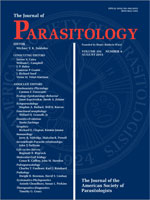It is well established that parasites in the phylum Nematomorpha induce suicide behavior of their insect hosts to bring adult worms to the appropriate habitat for emergence. It is not well established, however, whether other nematomorph-induced behavioral alterations occur before worm emergence. The purpose of our study was to evaluate the effect of the nematomorph Paragordius varius on the calling behavior of the male house cricket Acheta domesticus. We hypothesized that cricket calling, an energetically expensive and risky behavior, would be a potential target for nematomorph-induced behavioral alterations. We assessed if and how infection with P. varius affects A. domesticus calling behavior and whether the presence of wings at time of exposure to P. varius influenced changes in calling behavior. We recorded the calling behavior of male A. domesticus over the course of their infection after exposure to P. various before or after wing development. Additionally, we assessed whether winged crickets were “callers” or “noncallers” before exposure. We found that regardless of cricket developmental stage (or age) at time of infection, infected crickets spent significantly less time calling than their uninfected counterparts but only during the later stages of infection. Developmental stage at infection did affect whether crickets became callers: when infected before wing development significantly more uninfected crickets initiated calling; there was no difference between infected and uninfected crickets when infected as winged adults. Infection was a factor in whether callers stopped calling, with more infected crickets ceasing to call than uninfected crickets. This is the first study to show that infection with nematomorphs affects calling behavior of their insect host. Cricket calling behavior is immensely complex and although it was difficult to elucidate the adaptive nature of these parasite-induced behavioral changes, this study lays the groundwork for future studies to begin teasing out the factors that will help make the determination between side effect of infection or parasite/host adaptation.
How to translate text using browser tools
1 August 2015
Calling Behavior of Male Acheta domesticus Crickets Infected with Paragordius varius (Nematomorpha: Gordiida)
A. Barquin,
B. McGehee,
R. T. Sedam,
W. L. Gordy,
B. Hanelt,
M. R. Wise de Valdez
ACCESS THE FULL ARTICLE

Journal of Parasitology
Vol. 101 • No. 4
August 2015
Vol. 101 • No. 4
August 2015




